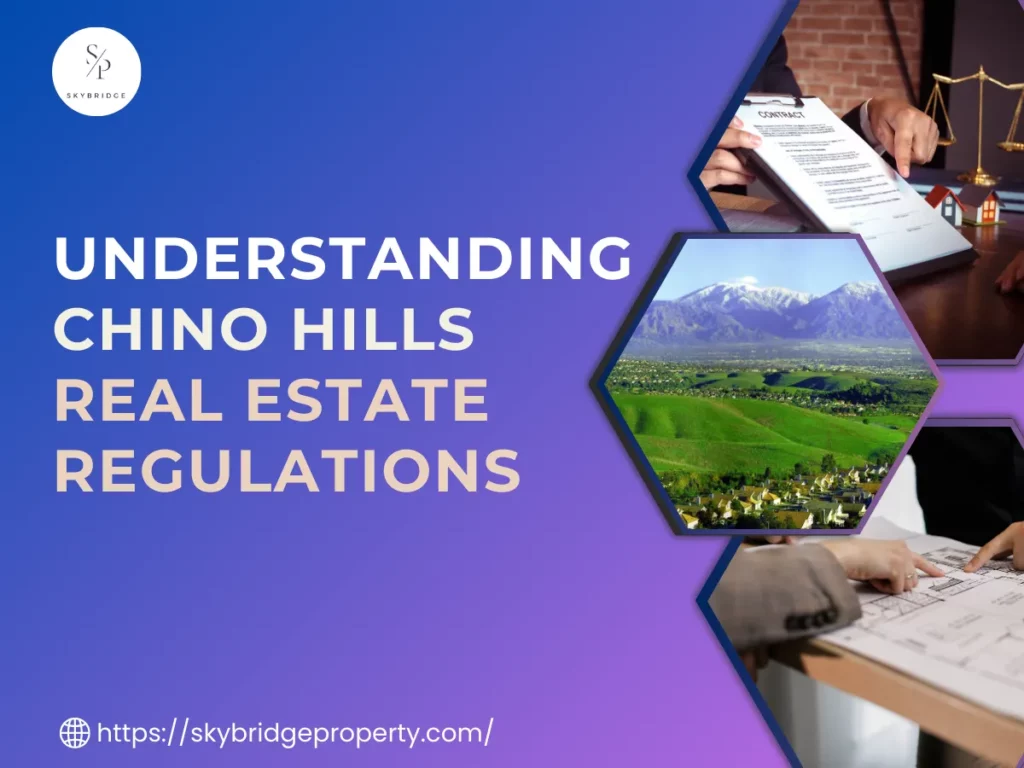Real estate regulations in Chino Hills play a crucial role in shaping how properties are sold, leased, bought, and maintained. Whether you’re a property owner, landlord, or investor, understanding these rules is essential to manage the assets effectively, make informed decisions, and avoid legal issues. Local laws govern everything like zoning requirements which determine how land can be used, as well as short-term rental policies to property maintenance codes that impact how properties can be developed, sold, or leased.
Getting familiar with these rules and regulations helps property owners manage their assets, ensure compliance with city guidelines, and maximize the value of your investment.
Zoning and Land Use Regulations
Zoning and land use regulations in Chino Hills are legal regulations enacted by local governments and these regulations are outlined in the city’s Zoning Ordinance and Development Code to control how land is used within their jurisdictions. Zoning laws categorize the land into different zoning districts like commercial, residential, industrial, and agricultural. They help regulate the city’s planned growth, ensure compatibility, and protect property values between different property types. In simple terms, zoning prevents industrial buildings from being built in residential neighborhoods.
Chino Hills has several zoning classifications that are used to regulate land use and governing specific types of development. Here are some common zoning designations:
- R1 for single-family homes: Designed for detached single-family homes on individual lots, typically with restrictions on lot size, set backs, and building height to maintain the character of single-family neighborhoods.
- R2 for multi-family units: Allows for higher-density residential development such as condominiums, townhomes, and small apartment buildings, with different requirements for lot size, building height, and density than R1.
- C1 for commercial properties: This is designed for retail stores, restaurants, offices, and other businesses that serve the needs of nearby residents.
- MU- Mixed-Use: This combines commercial spaces and residential spaces while promoting walkable urban-style development.
- O – Open Space: This reserves parks, recreational areas, and natural land while restricting residential and commercial development.
Zoning laws are regularly updated to accommodate the city’s growth and changing needs. Some of the recent proposed changes in Chino Hills are Revision to ADU Regulations allowing homeowners to build granny flats of in-law suites, New Commercial and Mixed-Use Developments where certain areas have been rezoned to support mixed-use projects, and Restrictions on Short-Term Rentals to protect neighborhood integrity.
Apart from zoning classifications, Chino Hills enforces regulations on building height, lot coverage, and property modifications to maintain the city’s functional balance.
Building Height Limits: Zoning ordinances has specified a maximum height restriction of 35 feet to residential structures to maintain neighborhood character and prevent obstruction of views and excessive shading.
Lot Coverage Rules: These regulations determine what percentage of a lot can be covered by buildings and other surfaces to ensure adequate open space, light penetration, and drainage.
Setbacks: One of the setbacks is that the buildings must maintain a minimum distance from property lines, neighboring buildings, and streets.
Homeowner associations (HOA): Most of the residential locations within Chino Hills are subject to HOA rules that act as another layer of regulation to property modification.
Property owners can find the official zoning details of Chino Hills from the City of Chino Hills Planning Division along with Zoning Maps & Development Code, Permit Applications & Land Use Guidelines, and Public Meetings & Zoning Hearings.
Short-Term Rental Restrictions
Short-term rentals refer to the practice of renting out a residential property such as Airbnb on a short-term basis typically ranging from a few days to a few weeks. Although these rentals can be lucrative, they also impact residential neighborhoods by increasing noise, traffic, reduced housing availability, and safety and security concerns. Hence, to maintain community integrity, Chino Hills has strict regulations on STRs like property owners must obtain a city-issued permit, adhere to guest limits, and comply with local tax obligations to ensure neighborhood safety.
Non-compliance can lead to a range of hefty penalties which can increase for repeated offenses, revocation of rental rights, permit suspension, insurance issues, or legal actions, making it essential for landlords to stay informed. Moreover, HOAs impose even stricter STR restrictions, sometimes banning them altogether, regardless of city regulations. For those unable to operate STRs, alternative rental strategies like long-term leasing offer a more stable and legally compliant way to generate income while avoiding regulatory hurdles. Understanding Chino Hills’ stance on STRs helps property owners make informed decisions while maintaining good standing within their communities.
Property Maintenance and Code Compliance
Maintaining a property in Chino Hills isn’t just about curb apparel, it is a legal responsibility that falls under property maintenance and code compliance standards. It is to help preserve neighborhood quality, aesthetics, uphold community quality of life, and ensure safety. The city enforces strict property maintenance standards that requires homeowners to keep their lawns trimmed, exteriors in good condition, and trash properly managed.
Besides that, building codes focus on fire prevention, tenant habitability, and structural safety, ensuring homes and rental properties remain secure and livable. Chino Hills’ Code Enforcement Division conducts inspections, either in response to complaints or as part of routine checks, and property owners who violate maintenance or safety codes may receive warnings, fines, or even legal action if issues go unresolved. Some of the common violations include unsafe rental conditions, unpermitted construction, and overgrown yards which can lead to hefty penalties.
To keep things running smoothly, homeowners and landlords can take a friendly approach by regularly checking in on their properties, tackling repairs as they come up, and making sure any changes follow local city rules. By staying engaged with maintenance, property owners can not only safeguard their investments but also help create a welcoming and well-maintained community for everyone.
Signage Regulations
Chio Hills enforces strict signage regulations to uphold the city’s clean and organized appearance, while also ensuring public safety. Property owners must adhere to specific guidelines regarding the size, placement, and illumination of signs, whether for residential or commercial use. In residential areas, homeowners can display real estate signs, garage sale notices, and security signs, but these signs must meet size restrictions and be placed solely on private property. For commercial properties, allowable sign types include wall-mounted signs, monument signs, window decals, and banners, each of which must comply with zoning regulations.
Illuminated signs are subject to brightness restrictions to minimize glare and distractions for drivers. Both temporary and permanent signs may require a permit from the Chino Hills Planning Division. Failure to obtain the necessary permits can lead to citations, fines, or even mandatory removal of the signs. To avoid penalties, property and business owners should consult the city’s signage regulations before installing any signs. By ensuring compliance, they can effectively promote their properties or businesses without violating city ordinances.
CC&Rs (Covenants, Conditions, and Restrictions)
CC&Rs are the rules that govern how a property can be used in a planned condominium complex, planned community, or other common-interest development. These rules help keep property values high, maintain the look of the neighborhood, and ensure a good living experience for everyone. They cover things like how homes should look, noise levels, pet ownership, and parking rules. This helps create a well-organized and friendly community.
City regulations apply to all properties in Chino Hills, but Covenants, Conditions, and Restrictions (CC&Rs) are specific to homeowners’ association (HOA) communities and can impose stricter rules. For example, while the city may permit a certain type of fencing, an HOA might prohibit it in order to maintain the neighborhood’s aesthetics. When there’s a conflict between CC&Rs and city laws, the HOA rules typically take precedence within the community, as homeowners have agreed to follow them when purchasing their properties.
Property owners should read the CC&Rs carefully before making any changes to their homes or property. You usually receive these documents when you buy your home, and you can also find them on the HOA’s website or at the management office. If you want to make renovations or even change landscaping, you will need written approval from the HOA to ensure compliance with community guidelines.
Failing to comply with CC&Rs can result in warnings, fines, and even legal action by the HOA. The HOA may even place a lien on the property or take further steps if the violations go unaddressed. Homeowners should know their community’s rules (CC&Rs) and talk to their HOA before making any changes to their property. By understanding and following these rules, homeowners can avoid problems, protect their investments, and help keep Chino Hills a well-maintained and thriving community.
Compliance with State and Federal Laws
Homeowners in Chino Hills must follow local rules, as well as California state laws and federal housing policies that affect real estate practices. Key areas of legal compliance involve fair housing laws, which stop discrimination in renting or selling properties, tenant rights, which protect renters from unfair evictions and ensure safe living conditions, and environmental regulations, which require proper waste disposal, water conservation, and safe handling of hazardous materials. Not following these laws can result in legal penalties, fines, or lawsuits. Therefore, property owners must stay updated and make sure their properties comply with all state and federal requirements.
Fair Housing
Fair housing laws protect people from discrimination when renting or buying homes. The Fair Housing Act (FHA) makes it illegal to discriminate based on race, religion, national origin, sex, disability, or family status. In California, the Fair Employment and Housing Act (FEHA) adds protections for source of income, marital status, age, and immigration status. Common violations include refusing to rent to someone or misrepresenting available properties based on these protected categories. To follow these laws, landlords must treat all applicants equally, avoid bias in advertisements, and offer reasonable accommodations for tenants with disabilities.
Tenant Rights
In California, tenant rights are safeguarded by landlord-tenant laws, ensuring fair treatment and safe living conditions. Tenants have the right to a habitable home, eviction protections, and security deposit law under this. Chino Hills lacks local rent control, but the California Tenant Protection Act (AB 1482) restricts annual rent increases for eligible properties. Lease agreements should adhere to state laws and clearly define rental terms, responsibilities, and tenant protections to support fair housing practices.
Environmental Laws
Property owners in Chino Hills must follow California’s environmental laws. These laws cover hazardous materials, water conservation, and energy efficiency. Sellers and landlords are required to disclose environmental hazards such as lead-based paint, asbestos, and mold to ensure tenant safety. Additionally, rental properties must comply with state water conservation regulations, which include the use of low-flow plumbing fixtures. They also need to meet energy efficiency standards, including proper insulation and efficient heating systems. Chino Hills may provide sustainability incentives for eco-friendly upgrades, such as solar panels or drought-resistant landscaping.
How SkyBridge Property Group Help You Stay Compliant?
Homeowners, property managers, and developers in Chino Hills must understand local laws, state laws, and federal regulations. Knowing about zoning laws, tenant rights, fair housing policies, and environmental rules is important. This helps avoid legal problems and protects property values. Likewise, seek professional legal advice and refer to the Chino Hills Municipal Code when needed to ensure compliance. And for expert guidance on professional Chino Hills property management services, reach out to SkyBridge Property Group. We are focused on helping owners stay compliant while maximizing their investments, navigating complex legal requirements, and maintaining properties efficiently in Chino Hills.







